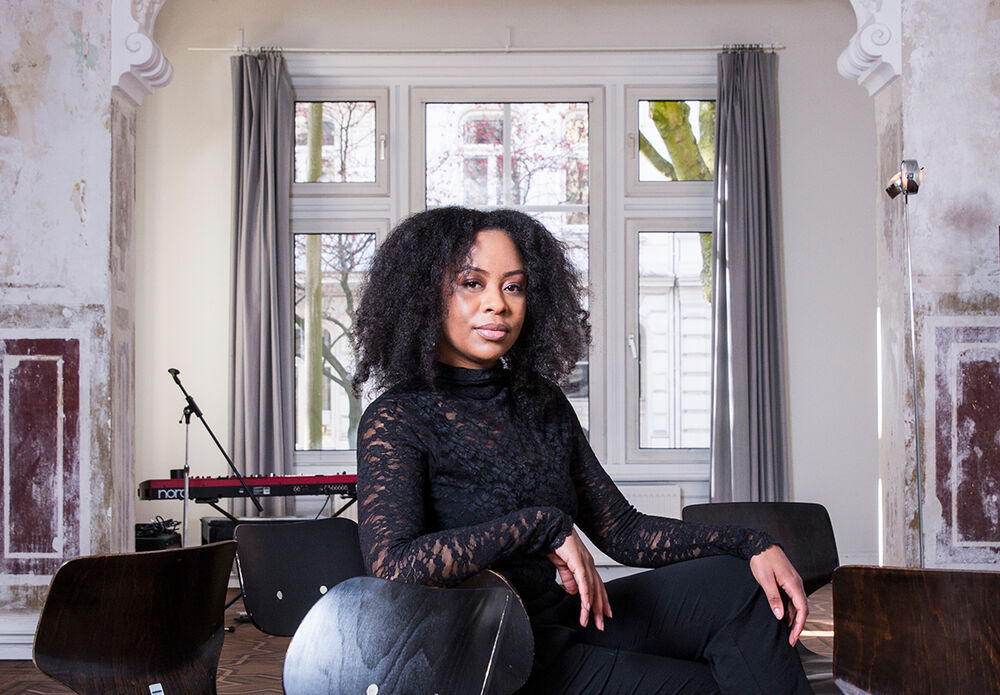In SERIES #4 we are happy to host online for a close-up artist interview Vitjitua Ndjiharine, who is an visual artists from Namibia.
How does your current artistic practice look like?
My artistic practice is multidisciplinary. I also love collaborations. Currently I am thinking of ways to collaborate with others and continue to make versatile works that can be experienced both in person and online.
For which three things are you very thankful at the moment?
I am thankful for my health, for my family and the opportunities I get to create during these times.
What have you learned during this time: What can you do without, that you usually stick to?
During this time I’ve really learnt to enjoy my own company. To be on my own and to be ok with doing nothing. To not always feel bad for not “being busy”. There was so much talk going around about how one should use the lockdown period to write a book, sign up for a course or learn a new language etc. I think all that is great. But if you were not able to do any of those things, don’t feel bad about it. Sometimes down time is needed.
How do you deal with the uncertainty of the future?
I think the future is always uncertain no matter the times. We will never know what the future holds, and we aren’t meant to be either. For me the key is to take it one day at a time. One step at a time. That’s all you can do.
At which place would you choose to be at the moment?
There are several places I can think of, but in all honesty I am just happy to be home and safe during these times.
Which connection do you have to nature currently?
I’ve currently been doing a bit of planting here and there. Growing little seedlings has helped me find that connection and just a general respect for life.
In how far the Corona pandemic is an allegory of global capitalism?
This crisis has shown us just how small the world is, and just how much everything we do as human beings affects everything else on the planet. This crisis has also exposed the levels of inequality and how this fundamentally impacts lives. All of this is connected to hypercapitalism.
African intellectuals as Felwine Sarr, Achille Mbembe and Wole Soyinka consider the Covid-19 crises a chance for Africa. What do you think about that?
I agree. Times of crisis are also times for innovations. I think it’s a great chance, provided Africa can stay ahead of the curve. So far the number of cases have been relatively low compared to other parts of the world. This is a great moment for Africa to invest in Africa.
Who should view your art right now?
Curators, students, collectors, art lovers, gallerists, fellow artists and so much more. I think now is a great time to support your local artists or arts institutions.
What is your ONE question to the world (that you would stitch onto your M.Bassy-mouthgard)?
Are you ok?
Which topics are drowned out by Corona at the moment?
Here in Namibia I would say it’s topics about gender-based violence. Since the stay at home order was issued, the number of domestic abuse cases reported also went up.
To what extent do you feel responsible for educating white people in terms of racism?
I do not feel any responsibility for educating white people about racism. That responsibility is on them. Moreover, there are some white people who do know what racism is and its effects but choose not engage, because things are comfortable for them.
What options are there to fight racism?
I think there are plenty of options and depending on where in the world you live, the things that can be done to fight racism might differ. In some cases it could be lobbying your local leaders to help reform problematic systems that oppress black people. In other cases it could be getting involved with grassroots movements that educate and empower young people to fight racism. In yet another case, it could be educating yourself by reading up on history and the legacies of injustice that still haunt us today or donating to a cause such as Black Lives Matter. If you can't lobby, get involved or donate, then support black content creators, black owned business and black media. Show your solidarity. Show up and listen. Whatever it is, wherever you live, you can do something.
About Vitjitua Ndjiharine
Vitjitua Ndjiharine (1988) is a Namibian multidisciplinary visual artist. Her work is a culmination of her skills as a painter, illustrator, visual designer, art director and front end web developer. Born in Upstate New York to Namibian parents and raised in Namibia, Vitjitua draws inspiration from different cultural sources to create work exploring various strategies of critical engagement with problematic historical content by deconstructing and re-contextualizing text and images found within colonial photographic archives. In 2018 she received funding by the Gerda-Henkel-Foundation for a residency at the University of Hamburg’s research centre »Hamburg’s (post-)colonial legacy« to work on the German-Namibia colonial genocide with a final group exhibition at MARKK.

